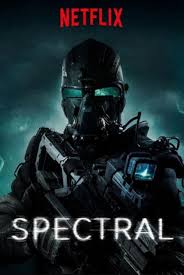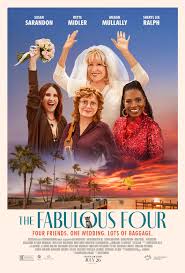Displaying items by tag: Bruce Greenwood
Spectral

SPECTRAL
US, 2016, 107 minutes, Colour.
James Badge Dale, Emily Mortimer, Bruce Greenwood, Max Martini.
Directed Nic Mathieu.
There are quite a number of spectres in Spectral.
The setting is a blend of the present and the future, arms developments in the United States, experiments, but a civil war in Moldava, the past with the Russian connection, uprisings, devastation.
The film opens with the soldier on patrol, encountering a spectral appearance, white and ghostly, which overcomes him, killing him. The general, place by Bruce Greenwood, contacts Virginia and asks for advice, especially in expert, Clyne, played by James Badge Dale. He is a skilled inventor of defence systems, especially the camera. He is sent to Moldava, explanations from the general, immediately going out on the expedition with his camera, a team of soldiers, some very sceptical.
There are encounters with many spectres, especially seen through the camera, and with devastating effect on overcoming the troops. Accompanying the group is a political and arms adviser, played by Emily Mortimer. The group finds two children, some explanation that the spectres can be warded off by iron filings and other scientific aspects.
A buildup to a final confrontation with the spectres, devastating killings of the soldiers, an escape by helicopter – and the scientist then speculating, rationally, on the possibilities of what they could be, decides, with the help of some theories by Einstein, that the scientists have been speculating on condensation is, and experimenting with human beings, to develop the spectres as a fighting force.
The climax is going to the town, finding the science complex and moral decision about terminating it.
- Title, expectations, science fiction, futuristic, supernatural themes, the ghosts?
- The opening in Virginia, Clyne and his work, vision? The action taking place in Moldova, the Civil War, the ruined city, the military headquarters, venturing out into the streets, the buildings, ruins, the spectral experiences? The musical score?
- The plausibility of the plot? Supernatural beings, or ghosts between life and death? The technology for cover-disguise? The revelation of the scientific advances, success, failures, consequences?
- Audience response to the soldiers, the initial experience with Davis, seeing the spectre, overcome, his death? The sequence repeated throughout the film?
- The general, his concern, contacting Virginia, the discussions with Clyne, his work, his advances? His going to Moldava, the explanations by the general? Fran and her presence, observing, her military perspective?
- The decision to go out into the streets, setting up the camera, the tanks, the camera showing up the spectral vision, the consequences for the soldiers, the many deaths, the many creatures?
- The finding of the children, their father, ceramics, the iron filings as protection? The finding of the soldier hiding under the tub? Joining the squad?
- The squad, the commanders, the various personalities, suspicions, the experience of the spectres, their being overcome, the many deaths?
- Contact, losing contact, the possibility for a helicopter, getting to the landing, exposing themselves to the spectres? The help from the children? The little boy going out, his death? Fran, her scepticism, change of heart, becoming involved?
- Clyne, his character, dedication to his work, the camera, his rational arguments, setting up the camera as the searchlight, highlighting the spectres?
- The buildup to the climax, the escape to the helicopter pad, the helicopter, the rescue? The headquarters gone, meeting with the general?
- Clyne, the background of Einstein, theories of condensation, going to the plant, the huge process, the many spectres, experiments, on human beings, kept alive, the issue of pain? Clyne and his decision to terminate the experiment? Fran wanting the new knowledge?
- The blend of fantasy and reality, military, military developments, science and rational explanations?
Fabulous Four, The

THE FABULOUS FOUR
US, 2024, 98 minutes, Colour.
Bette Midler, Susan Sarandon, Megan Mullaly, Sheryl Lee Ralph, Bruce Greenwood, Kadan Well Bennett, Timothy V.Murphy, Michael Bolton.
Directed by Jocelyn Moorhouse.
On the one hand, a 99 minutes promotion campaign for Tik-Tok. On the other hand, a 99 minutes promotion campaign for Tik-Tok.
The title is exciting. Fabulous. And the four are old friends, definitely old, stars Bette Midler born 1945, Susan Sarandon, 1946 and Megan Mullaly and Sheryl Lee Ralph in the mid-1950s. Their friendship in this story goes back more than half a century, back to college days and shared rooms.
But, Marilyn, an irrepressible Bette Midler, audiences enjoying her irrepressibability, is now a widow, takes off for Ernest Hemingway territory, Key West, Florida, where she and her husband of 48 years used to go on vacation. Suddenly, a chance meeting, engagement, marriage again and lots (and lots) of Tik-Tok, Marilyn confessing she is Tik-Tok addict.
What follows is extroverted, ebullient, so a psychology warning. Strong extroverts will be caught up in all the hoopla. Those more introvertedly inclined may well find this too much, possibly needing some breaks, long and frequent pauses when streaming viewing.
Marilyn’s two friends, Alice, a singer, drugs, promiscuous (Megan Mullaly from Will and Grace only much more so) is hard to take. Kitty, Sheryl Lee Ralph, a botanist, with family problems. But there is the very serious Lou, Susan Sarandon, a noted heart surgeon who has strong emotional responses from being once a best friend of Marilyn, now alienated.
Most of the action takes place in a gaudy-looking Key West, plus some affluent bars and mansions.
A lot of the action is frivolous, even farcical, hedonistic and everyone having a splashy good time. But Susan Sarandon and Bruce Greenwood bring some serious dimensions to characters and the situations. Some of their quiet conversations and self-revelations can be a bit of relief for the quiet audience, but long interruptions for those who want to get on with it. And, of course, ultimately there is a move towards apologies and reconciliation.
Surprisingly, the film was directed by Australian Jocelyn Moorhouse (Proof, The Dressmaker). She is certainly letting her hair down here, culminating in an all-dance sequence, “I can see clearly now, the rain has gone…”..
Calling these characters fabulous is, as the Americans might say, pretty much of a stretch.